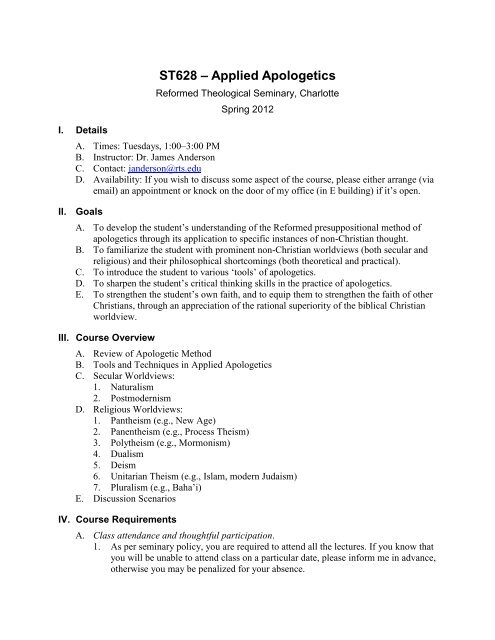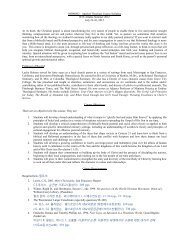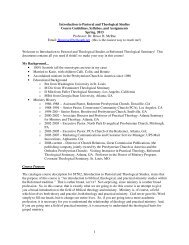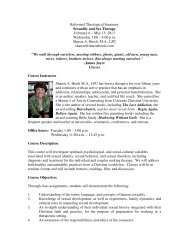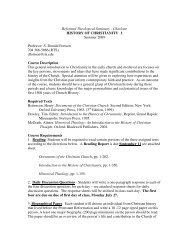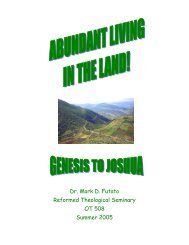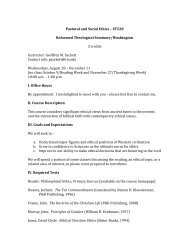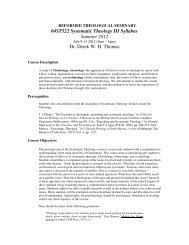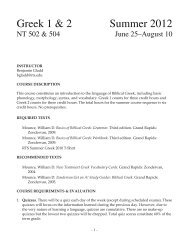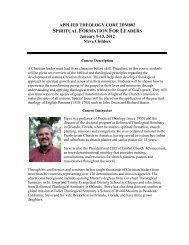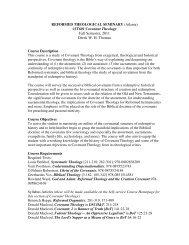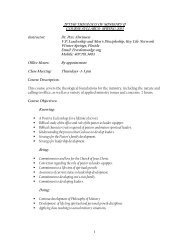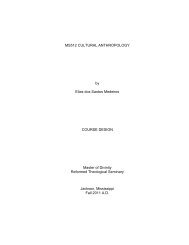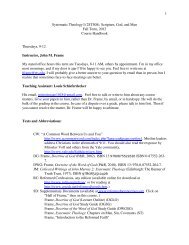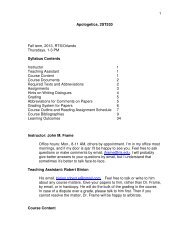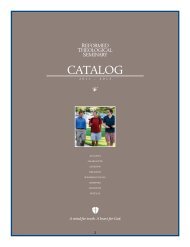ST628 â Applied Apologetics - Reformed Theological Seminary
ST628 â Applied Apologetics - Reformed Theological Seminary
ST628 â Applied Apologetics - Reformed Theological Seminary
You also want an ePaper? Increase the reach of your titles
YUMPU automatically turns print PDFs into web optimized ePapers that Google loves.
I. Details<br />
<strong>ST628</strong> – <strong>Applied</strong> <strong>Apologetics</strong><br />
<strong>Reformed</strong> <strong>Theological</strong> <strong>Seminary</strong>, Charlotte<br />
Spring 2012<br />
A. Times: Tuesdays, 1:00–3:00 PM<br />
B. Instructor: Dr. James Anderson<br />
C. Contact: janderson@rts.edu<br />
D. Availability: If you wish to discuss some aspect of the course, please either arrange (via<br />
email) an appointment or knock on the door of my office (in E building) if it‘s open.<br />
II. Goals<br />
A. To develop the student‘s understanding of the <strong>Reformed</strong> presuppositional method of<br />
apologetics through its application to specific instances of non-Christian thought.<br />
B. To familiarize the student with prominent non-Christian worldviews (both secular and<br />
religious) and their philosophical shortcomings (both theoretical and practical).<br />
C. To introduce the student to various ‗tools‘ of apologetics.<br />
D. To sharpen the student‘s critical thinking skills in the practice of apologetics.<br />
E. To strengthen the student‘s own faith, and to equip them to strengthen the faith of other<br />
Christians, through an appreciation of the rational superiority of the biblical Christian<br />
worldview.<br />
III. Course Overview<br />
A. Review of Apologetic Method<br />
B. Tools and Techniques in <strong>Applied</strong> <strong>Apologetics</strong><br />
C. Secular Worldviews:<br />
1. Naturalism<br />
2. Postmodernism<br />
D. Religious Worldviews:<br />
1. Pantheism (e.g., New Age)<br />
2. Panentheism (e.g., Process Theism)<br />
3. Polytheism (e.g., Mormonism)<br />
4. Dualism<br />
5. Deism<br />
6. Unitarian Theism (e.g., Islam, modern Judaism)<br />
7. Pluralism (e.g., Baha‘i)<br />
E. Discussion Scenarios<br />
IV. Course Requirements<br />
A. Class attendance and thoughtful participation.<br />
1. As per seminary policy, you are required to attend all the lectures. If you know that<br />
you will be unable to attend class on a particular date, please inform me in advance,<br />
otherwise you may be penalized for your absence.
2. There will be opportunity for class participation (particularly toward the end of the<br />
course) and questions during the lectures.<br />
3. A proportion of your final grade (see below) will depend on your attendance record<br />
and your participation in the classes (thoughtful interaction with the professor and<br />
other students).<br />
B. Reading assignments.<br />
1. A proportion of your final exam mark (and thus your final grade) will depend on<br />
your acknowledgment that you have completed the required reading (see below).<br />
2. You will be penalized for each uncompleted reading assignment.<br />
3. A reading schedule will be provided at the start of class (available on the Course<br />
Home Page).<br />
C. Writing assignment.<br />
1. You should write a critical review paper (3500–4500 words, excluding footnotes)<br />
of a book which defends or promotes a non-Christian worldview (e.g., naturalism,<br />
deism, pantheism). (See below for some book suggestions.)<br />
2. Your paper should include all of the following:<br />
i. An explanation of how you identified the author‘s worldview from the text<br />
(you may make use of other writings from the same author in support).<br />
ii. A critique of the author‘s worldview, using the presuppositional approach<br />
illustrated in class.<br />
iii. A comparison of the author‘s worldview with the Christian worldview,<br />
explaining why the latter does not succumb to the criticisms you have made of<br />
the former.<br />
iv. An explanation of any significant logical fallacies or other errors of reasoning<br />
committed by the author.<br />
3. Your paper will be graded according to the following criteria, in no particular<br />
order: responsible use of Scripture, responsible use of sources, creativity, clarity,<br />
structure and coherence, cogency of argument, evidence of critical thinking, and<br />
good writing style (inc. grammar, spelling, and punctuation).<br />
4. The paper should cite at least 6 scholarly sources (other than the book reviewed).<br />
i. For the purposes of this paper, a scholarly source is a book or article by a<br />
recognized expert in the field (and not aimed at a popular level for a general<br />
audience)—ideally one that has been peer-reviewed.<br />
ii. Wikipedia is clearly not a scholarly source.<br />
iii. That said, with sufficient discernment, Wikipedia can be a useful pointer to<br />
scholarly sources and is generally reliable for fact-checking on uncontroversial<br />
issues.<br />
iv. Please consult me if you have any doubts about whether a source is scholarly.<br />
v. You should not rely heavily on web-based sources. Use the library!<br />
5. The paper should be word-processed, not hand-written.<br />
i. Use a 12-point font and double line-spacing for the main text.<br />
ii. Use section headings where applicable to improve readability.<br />
iii. Use footnotes (10-point font) rather than endnotes.<br />
iv. Use a recognized scholarly style for citations (e.g., Chicago, Turabian, SBL).<br />
6. The paper should be submitted with a title page containing all of the following: the<br />
name and year of the course; your name; the professor‘s name; the title of the
paper; and the exact word count for the main text of the paper (obtained from your<br />
word processor‘s word-count feature).<br />
7. You will be penalized if you do not observe the requirements and guidelines above.<br />
8. Your paper is due on May 8. It should be submitted to the assistant (usually Linda<br />
Dixon) at the main front desk on or prior to this date. Ensure that the assistant<br />
stamps the paper with the date of submission. Late submissions will be penalized.<br />
9. Your paper will be returned to you after grading with limited feedback. Consult the<br />
document ―Guide to Annotations on Graded Papers‖ to crack the code. If you wish<br />
to receive more detailed feedback, please email me to arrange an appointment.<br />
D. Final exam.<br />
1. The final exam will be taken in exam week: May 10–15.<br />
2. The exam will consist of a combination of short-answer and short-essay questions<br />
based on all of the class material and all of the required readings. You will have 2<br />
hours to complete it.<br />
3. You may refer to an English translation of the Bible (but not one with study notes,<br />
etc.). You may not refer to any class notes or other study resources.<br />
4. You will be asked to sign a declaration that you have not discussed the content of<br />
the exam with any other students before taking it.<br />
5. You will also be asked to indicate which of the required reading assignments you<br />
have completed and to sign a declaration to that effect.<br />
V. Course Documents<br />
A. Instructions for accessing course documents on Course Home Page.<br />
1. Login to the Self-Service website (https://selfservice.rts.edu).<br />
2. Select Classes > Schedule > Student Schedule.<br />
3. Select the period (―2012/Spring‖) from the drop-down menu.<br />
4. Click on the link ―Go to Course Home Page‖ for the relevant class.<br />
5. Select Course Documents.<br />
6. All the course documents can be found in the ―Section Media‖ folder.<br />
B. Course outline.<br />
1. Other than the syllabus, the course outline is the most important document. You<br />
will need a copy (either electronic or printed) in front of you throughout the class.<br />
2. You are strongly encouraged to supplement the outline with your own notes.<br />
3. The outline will be uploaded to the Course Home Page the week before class.<br />
C. Supplementary documents.<br />
1. Some of the required and recommended readings (see below) will be available on<br />
the Course Home Page.<br />
2. You should also consult the document ―Guide to Annotations on Graded Papers‖.<br />
VI. Grading<br />
A. Class attendance and participation — 10%<br />
B. Final exam (including credit for reading assignments) — 40%<br />
C. Review paper — 50%<br />
VII. Required Reading<br />
A. John M. Frame, <strong>Apologetics</strong> to the Glory of God (P&R, 1994).
B. Norman L. Geisler and Ronald M. Brooks, Come, Let Us Reason: An Introduction to<br />
Logical Thinking (Baker, 1990).<br />
C. Gregory Koukl, Tactics (Zondervan, 2009).<br />
D. James W. Sire, The Universe Next Door (InterVarsity Press, 5 th edition, 2009).<br />
E. John M. Frame, ―How to Write a <strong>Theological</strong> Paper,‖ Appendix F in The Doctrine of<br />
the Knowledge of God (P&R, 1987). [A copy of this will be made available on the<br />
Course Home Page.]<br />
F. C. Stephen Evans, Pocket Dictionary of <strong>Apologetics</strong> & Philosophy of Religion<br />
(InterVarsity Press, 2002).<br />
Note: You should obtain copies of all of the above. You should have read A by the end of the<br />
second week of class (February 10) and B-E in preparation for the review paper and final exam.<br />
Each book should be read in full, including appendices. You do not need to read F from cover to<br />
cover, but you should have it available as a reference during class.<br />
VIII. Recommended Supplementary Reading<br />
A. James N. Anderson, ―Secular Responses to the Problem of Induction‖ (2000). [A copy<br />
of this will be made available on the Course Home Page.]<br />
B. James N. Anderson and Greg Welty, ―The Lord of Non-Contradiction: An Argument<br />
for God from Logic‖ (2011). [A copy of this will be made available on the Course<br />
Home Page.]<br />
C. Greg L. Bahnsen, Always Ready (Covenant Media Foundation, 1996). [A practical<br />
introduction to presuppositional apologetics.]<br />
D. Greg L. Bahnsen, Van Til’s Apologetic: Readings and Analysis (P&R, 1998). [The<br />
definitive exposition of Van Til‘s presuppositionalism: a combination of representative<br />
excerpts from Van Til‘s writings and Bahnsen‘s insightful, concise commentary. Highly<br />
recommended.]<br />
E. Ergun M. Caner and Emir F. Caner, Unveiling Islam (Kregel, updated edition, 2009). [A<br />
fairly reliable introduction to Muslim beliefs and practices from two former Muslims.]<br />
F. James Fieser and Bradley Dowden, eds., Internet Encyclopedia of Philosophy<br />
(http://www.iep.utm.edu). [A free, online, peer-reviewed encyclopedia of philosophy;<br />
contains good articles on many of the philosophical concepts discussed in the course.]<br />
G. Stanley J. Grenz, A Primer on Postmodernism (Eerdmans, 1996). [As you might expect<br />
from the title, a primer on postmodernism. A reliable introduction but weak on critique.]<br />
H. Douglas Groothuis, Truth Decay (InterVarsity Press, 2000). [A readable and incisive<br />
critique of typical postmodernist claims.]<br />
I. Gary R. Habermas, The Case for the Resurrection of Jesus (Kregel, 2004). [An up-todate<br />
handbook of evidences for the historicity of the Resurrection. Evidentialist in its<br />
methodological orientation, but still invaluable for ‗moderate‘ presuppositionalists.]<br />
J. Timothy Keller, The Reason for God: Belief in an Age of Skepticism (Dutton, 2008).<br />
[An apologia for the Christian faith aimed at 21 st -century Western unbelievers. Keller‘s<br />
approach is eclectic, but has presuppositionalist themes; he cites Van Til and Frame as<br />
positive influences. A good example of culturally-aware apologetics.]<br />
K. Michael J. Murray, ed., Reason for the Hope Within (Eerdmans, 1999). [A useful<br />
collection of essays on various topics relevant to applied Christian apologetics.]<br />
L. Ronald H. Nash, ed., Process Theology (Baker Book House, 1987). [A volume of<br />
essays critiquing process theology from an evangelical perspective.]
M. Victor Reppert, C.S. Lewis’s Dangerous Idea (InterVarsity Press, 2003). [An updated<br />
defense of Lewis‘s ―argument from reason‖ against metaphysical naturalism.]<br />
N. Jay W. Richards, The Untamed God (InterVarsity Press, 2003). [A defense of classical<br />
theism—includes a critique of Hartshorne‘s process theology.]<br />
O. Cornelius Van Til, Christian <strong>Apologetics</strong> (P&R, 2 nd edition, 2003). [A relatively<br />
accessible introduction to Van Til‘s presuppositionalism. This edition features an<br />
introduction and explanatory notes by William Edgar.]<br />
P. Edward N. Zalta, ed., Stanford Encyclopedia of Philosophy (http://plato.stanford.edu).<br />
[A free, online, peer-reviewed encyclopedia of philosophy; contains good articles on<br />
many of the philosophical concepts discussed in the course.]<br />
Note: You are not required to read any of the above, but you may find them useful to consolidate<br />
the course material and for further study as your interests dictate. For many of these, the table of<br />
contents can be viewed on Amazon.com or Google Books.<br />
IX. Suggestions for Books to Review<br />
A. Marcus Borg: The God We Never Knew<br />
B. Deepak Chopra: How to Know God / The Seven Spiritual Laws of Success<br />
C. John B. Cobb, Jr. & David Ray Griffin: Process Theology: An Introductory Exposition<br />
D. Don Cupitt: Taking Leave of God / The Sea of Faith<br />
E. Paul Davies: The Mind of God / The Fifth Miracle<br />
F. Richard Dawkins: The Selfish Gene / The Blind Watchmaker / The God Delusion<br />
G. Daniel Dennett: Darwin’s Dangerous Idea / Breaking the Spell<br />
H. Sam Harris: The End of Faith / Letter to a Christian Nation / The Moral Landscape<br />
I. Stephen Hawking: A Brief History of Time / The Grand Design<br />
J. John Hick, An Interpretation of Religion / God Has Many Names<br />
K. Christopher Hitchens: God is Not Great<br />
L. Richard Holloway: Godless Morality / Doubts and Loves<br />
M. Harold Kushner: When Bad Things Happen to Good People<br />
N. Robert L. Millet: A Different Jesus?<br />
O. Thomas Paine: The Age of Reason<br />
P. Tariq Ramadan: What I Believe / The Quest for Meaning<br />
Q. Feisal Abdul Rauf: What’s Right with Islam<br />
R. Stephen E. Robinson: Are Mormons Christians?<br />
S. Peter Rollins: How (Not) to Speak of God<br />
T. Alexander Rosenberg, The Atheist’s Guide to Reality: Enjoying Life without Illusions<br />
U. Bertrand Russell: Why I am Not a Christian<br />
V. Eckhart Tolle: The Power of Now / A New Earth<br />
Note: The above are merely suggestions. You are free to choose any book you think will allow<br />
you to fulfill the paper requirements, but be sure that your chosen book does allow you to meet<br />
those requirements. I recommend that you spend time doing some research (e.g., Google<br />
searches, Amazon reviews) before settling on a final choice.
Course:<br />
Professor:<br />
Campus:<br />
Course Objectives Related to MDiv* Student Learning Outcomes<br />
<strong>Applied</strong> <strong>Apologetics</strong><br />
James N. Anderson<br />
Charlotte<br />
Date: 01/21/11<br />
MDiv* Student Learning Outcomes<br />
In order to measure the success of the MDiv curriculum, RTS has defined<br />
the following as the intended outcomes of the student learning process.<br />
Each course contributes to these overall outcomes. This rubric shows the<br />
contribution of this course to the MDiv outcomes.<br />
*As the MDiv is the core degree at RTS, the MDiv rubric will be used in this syllabus.<br />
Articulation<br />
(oral &<br />
written)<br />
Scripture<br />
<strong>Reformed</strong><br />
Theology<br />
Broadly understands and articulates knowledge, both<br />
oral and written, of essential biblical, theological,<br />
historical, and cultural/global information, including<br />
details, concepts, and frameworks.<br />
Significant knowledge of the original meaning of<br />
Scripture. Also, the concepts for and skill to research<br />
further into the original meaning of Scripture and to<br />
apply Scripture to a variety of modern circumstances.<br />
(Includes appropriate use of original languages and<br />
hermeneutics; and integrates theological, historical,<br />
and cultural/global perspectives.)<br />
Significant knowledge of <strong>Reformed</strong> theology and<br />
practice, with emphasis on the Westminster<br />
Standards.<br />
<br />
<br />
<br />
<br />
Rubric<br />
Strong<br />
Moderate<br />
Minimal<br />
None<br />
Moderate<br />
Minimal<br />
Minimal<br />
Mini-Justification<br />
1. Critical review/application paper<br />
2. Final exam tests knowledge and<br />
articulation of course topics<br />
3. Class discussion questions testing<br />
understanding and application<br />
1. Reviews biblical basis for<br />
presuppositional methodology<br />
2. Reviews exegetical arguments<br />
against cults (Jehovah’s Witnesses,<br />
etc.)<br />
1. Relevance of <strong>Reformed</strong> distinctives<br />
to Christian worldview and apologetic<br />
methodology<br />
Sanctification<br />
Desire for<br />
Worldview<br />
Winsomely<br />
<strong>Reformed</strong><br />
Preach<br />
Demonstrates a love for the Triune God that aids the<br />
student’s sanctification.<br />
Burning desire to conform all of life to the Word of<br />
God.<br />
Embraces a winsomely <strong>Reformed</strong> ethos. (Includes an<br />
appropriate ecumenical spirit with other Christians,<br />
especially Evangelicals; a concern to present the<br />
Gospel in a God-honoring manner to non-Christians;<br />
and a truth-in-love attitude in disagreements.)<br />
Ability to preach and teach the meaning of Scripture<br />
to both heart and mind with clarity and enthusiasm.<br />
Minimal<br />
Strong<br />
Moderate<br />
Minimal<br />
1. Emphasizes our dependence on God<br />
in all aspects of life<br />
2. Ultimate purpose of apologetics to<br />
glorify God<br />
1. Presuppositional methodology<br />
2. Holistic view of Christian faith<br />
3. Christian worldview shown to be<br />
foundational for all aspects of life<br />
1. Appreciation for material from non-<br />
<strong>Reformed</strong> apologists<br />
2. Emphasis on humility in apologetics<br />
3. Person-relative approach<br />
1. Critical thinking skills developed<br />
Worship<br />
Knowledgeable of historic and modern Christianworship<br />
forms; and ability to construct and skill to<br />
lead a worship service.<br />
None<br />
Shepherd<br />
Church/World<br />
Ability to shepherd the local congregation: aiding in<br />
spiritual maturity; promoting use of gifts and callings;<br />
and encouraging a concern for non-Christians, both<br />
in America and worldwide.<br />
Ability to interact within a denominational context,<br />
within the broader worldwide church, and with<br />
significant public issues.<br />
Moderate<br />
Moderate<br />
1. Importance of apologetics for<br />
evangelism<br />
2. Use of apologetics to edify and<br />
protect Christian believers<br />
1. Relevance of apologetics to public<br />
issues, ethics, politics, etc.<br />
2. Distinguishes Christian worldview<br />
from denominational distinctives


